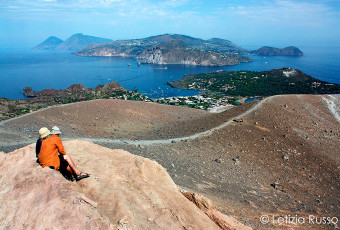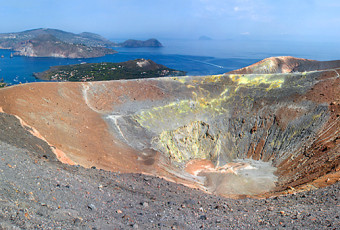History of Vulcano
“Therassia”, literally “land of heat”, is an ancient name of the island sacred to the god Vulcano. The Vulcano island is recognized at mythological level, in Greek tradition, as a seat of Hephaestus’ forges, the god of fire, technology and metallurgy. We cannot evade the Latin derivation and the mythological meaning gave by the Romans to god Hephaestus, in fact, the Roman mythological tradition identifies Hephaestus with god Vulcano, from whom the present name of the island derives. It is said that god Vulcano, helped by Cyclops, forged the arms for gods. As we learn from literature documentation during the classic era, the island is a result of the fusion of some volcanoes, and exactly four. The biggest one is the most active, at regular intervals; it is the Vulcano della Fossa, flanked to the smallest, Vulcanello.
Geologically the island was used, for many centuries, for works of extraction of alum and sulphur. Historically, we deduce that the population was mostly constituted by slaves forced to work as miners. The picture seems to be that of a sulphurous infernal circle of Dante. Under the Bourbons’ domination the mining activity has reached its climax, later to be transformed in a real industry. Once ceased the Bourbons’ domination, during the first half of the 19th century, an Englishman Stevenson, who continued the mining activity, and planted the first vineyards in Piano, bought the island. Today it is possible to admire his villa, the Castello, situated near the muds. The Englishman left the island after a dangerous eruption, maybe the last one, in 1888. The few colonies who left used as best they could the recourses of the island but the most representative activity under the economic aspect of the “hot land” is surely the activity turning around that volcanic cone so near and mighty, but at the same time, so quiet and silent; remember that the volcano has been inactive for more than a century. It remains, however, a land full of life: hissings, the heat of evaporating steams, and the colourful structures of sulphur, are there to remember the majesty of nature which can change the fate of a landscape, and redraw the morphology of a land which, for this reason, remains magic and mythological in each century. It is said that men become immortal if a masterpiece, of literary or other genre, keeps their memory. Vulcano is not only the mythological land, the cradle of the Greek god Hephaestus, but it made immortal, after decades of silence and indifference for this natural paradise, the cinema director Dieterle, who in 1949, shoot the namesake film, performed by the passionate Anna Magnani.







